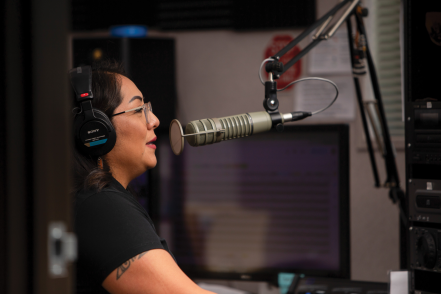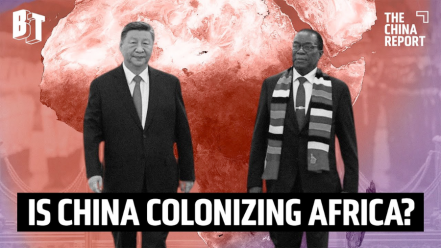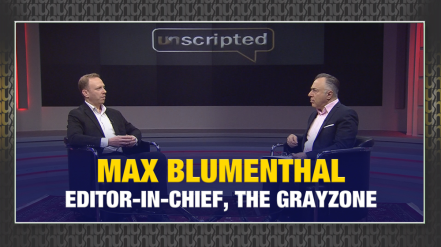
Indigenous radio, a victim of the cuts
By Dennis Broe
In the old days, when protests were allowed, a popular slogan on any march was “Don’t Mourn, Organize.” This slogan is useful to recall in the aftermath of Trump’s defunding of public television and radio, National Public Radio and television’s Public Broadcasting System. The effect of withdrawing $1.1 billion in public funds has meant a shutdown of the Corporation for Public Broadcasting, which funded the two entities. There are some horrible repercussions to this action, the worst being the defunding of local public radio and television stations which often did serve the public interest, including Native American stations.
The Republicans claim that “public media” was biased against them and so in their usual way they simply took a sledgehammer to the problem. The larger problem though, outside the reprehensive cutting off of lifelines to local communities, is that the biased criticism is a chimera. Programs like the PBS News Hour and Amanpour & Company do not skew left, they skew Centrist Democrat which after Biden’s reworking of the party as the party of war and genocide, means there is hardly a word against either war or genocide in their Washington utterances.
Admittedly there is still some good work done in documentaries on the series Frontline. On the other hand, the title of NPR’s flagship series All Things Considered couldn’t be further from the truth, and should more accurately be titled All Things Considered Within the Washington Beltway and the Washington Consensus, where the range of opinion grows narrower every day.
American “public” media was in fact never that. Instead, it was a public / private partnership with PBS heavily funded by both corporations and corporate foundations like the Bill and Melinda Gates Foundation, which with Gates rapidly buying U.S. farmland and attempting to control the agricultural supply might not be too critical of shows which boost big agra production, and Liberty Mutual Insurance which was recently ordered by the state of Delaware to pay $300,000 in fines for misleading consumers, making one wonder if they are not doing the same with their contribution to “public” broadcasting.
The other useful distribution of public radio and television funds was to actual independent stations like those in the Pacifica Network, but that funding was cut off over 10 years ago, in an audit claim behind which was likely the implication that funding was not going to go to actual independent media, only to faux independent or “public” media.
So, what is to be done? Instead of contributing to this combination of corporate and government media, why not contribute and help fund actually existing independent media in the podcast sphere? Here are three recent examples of the difference that illustrate how these truly independent shows, without corporate or Washington-based funding, are not just expanding the Overton Window—the limit beyond which corporate media will not and cannot go—but shattering that window.
The China Report
One of the best of these is The China Report with alternating hosts KJ Noh and Amanda Yee. The show’s self-described purpose is “every week helping you sort through the propaganda with an independent view of the country we’re taught to hate but know so little about.” The show is made in collaboration with a group called Pivot to Peace, a direct counter to Obama’s Pivot to Asia which we now understand was a pivot to war in Asia to contain China. The latest show had Amanda Yee discussing China’s role in Africa with Zambian Socialist Dr. Fred M’membe who is currently running for president in that country. Together they sorted through the U.S. charge that China is not constructing infrastructure in Africa but indebting the continent, a persistent charge in U.S. media.

M’membe explained first that the charge is levelled by the European exploiters and colonizers of Africa which China did not take part in. And secondly, following the old adage that if you point a finger, there are three fingers pointing back at you, the charge of indebting Global South countries is the entire history and purpose of the International Monetary Fund and World Bank who impose harsh conditions on debtor nations that involve cutting social services.
China’s lending, in order to improve infrastructure, takes place over a longer period with no requirements on how to repay the debt. M’membe also pointed out that Zambia owes a great debt to China, which helped build the Tasara railway in the 1970s in which Chinese lives were lost, and the country is unlikely to forget this sacrifice, especially as it occurred at a time when China itself was still impoverished and just beginning to economically escape what it called “the century of humiliation” from the West.
The Grey Zone
One of the most fiery podcasts and most knowledgeable about all things West Asian and Israeli is The Grey Zone. On a recent show the host Max Blumenthal interviewed Anthony Aguilar, a decorated U.S. special forces operative who had enlisted in the Gaza Humanitarian Foundation because he thought the purpose was to feed starving Palestinians. He was shocked to find out that one of the actual purposes was to force those who showed up to receive food, mostly young men from starving families, to make their way past a narrow, enclosed area so that they could be secretly photographed by Israeli intelligence for possible future arrest or assassination, though many were shot by Israeli soldiers on the spot as they waited for aid. Aguilar’s story highlighted how, once having eliminated United Nations aid by claiming its distributors were members of Hamas, the GHF, was a shill operation mainly interested in securing Israeli intelligence.

Finally, there was Norwegian political scientist Glenn Diesen’s recent interview with economist Michael Hudson in which the economist pointed out that not only has Trump pushed India into a more cooperative mode with China and Russia—in China Trump is referred to as “Comrade Trump” and “Trump the Nation Builder,” that is of the Chinese nation—but also in the recent Shanghai Cooperation Organization meeting, Russia, now formerly turning its back on Europe, is constructing a pipeline to pump Siberian gas to China. Diesen stressed the futility for Europe of destroying the possibility of cheap Russian oil and gas and instead, as part of its complete resignation to the status of U.S. vassal state, buying fracked gas from the U.S. at exorbitant cost not only to the Europeans but also to the environment because of the extraction cost in the U.S. and the increased transport cost to ship fracked gas to Europe.
All these opinions are both beyond the mainstream corporate and public media and anticipate eventual recognition by that media years or decades from now. One other crucial issue of this new public sphere, which my co-host Toby had called “emergent media,” is the question of independence. These broadcasters count mostly on public support and are not primarily in the business for profit or because they are being paid by outside interests.
That issue came up recently when an article in Wired, a magazine that focuses on new technology and media, recently revealed that a host of podcasters in the independent sphere were actually being funded by Democratic Dark Money, including the most well-known of these David Pakman, who claims to have the highest ratings in the sphere.

The problem is not that the Democratic Party is funding these shows but that the funding is secret, allowing them to maintain the aura of independence when they, like many Republican podcasters, are partially paid by the party or at least got start-up and seed money from the party. What we’re watching then is bigger money intruding into an arena which becomes more popular and holds more political sway by the moment, as witness the Mamdani campaign in New York where Zoran’s use of social media helped earn him the mayoral nomination while his opponent Andrew Cuomo’s subsequent clumsy attempt to catch up in his videos is making him into a laughing stock.
Defund the BBC
In Britain the “Defund the BBC” campaign, was largely spurred on by the right, which claims the state-funded channel has a “liberal bias.” In fact, the service has more of a neoliberal bias, supporting Starmer’s bellicosity and austerity. A useful alternative is George Galloway’s increasingly more popular global podcast Mother of All Talk Shows. A recent topic was the turn toward supporting Palestine and criticizing Israel by the recently assassinated, highly influential campus organizer Charlie Kirk, whose Israeli donors left or were in the process of leaving him. Galloway’s questions about the “why” of the shooting of course never graced the oh-so-civil discourse of BBC News, with its reputation for fair-mindedness not extending farther than the limited discourse of the Labour and Conservative parties.
It should also be noted that the Republican plan in defunding NPR and PBS and especially the local stations is to replace them with far-right media. We are often caught between a rock and a hard place. Thus, the “soft power” Democratic Party institutions, including USAID and the National Endowment for Democracy, which simply was the wolfish black ops CIA in lambs clothing as promoting “democratic regime change,” is replaced by “hard power,” that is, more confrontational politics as the Department of Defense becomes the more aptly named Department of War, sinking Venezuelan ships, which might have been fishing boats, off the coast in a lawless execution.
It is hoped though that ant-corporate and anti-imperial truth telling of this still alternative sphere remains free, independent and questioning of both contemporary corporate and public media, serving as a non-subservient substitute for both.
For more of the same, listen and subscribe to the Culture & Barbarism Podcast at https://dennisbroe.substack.com/














